In venture capital, nearly €30 million was invested via independent managers and the ICF’s own funds. Financing to meet Covid-19 needs accounts for 34.6% of total funding, down almost 30 percentage points from 2020. Over the last three years, the public financial institution has pumped nearly €1.8 billion into 3,354 companies to drive growth, innovation and sustainability in the Catalan economy.

Barcelona, 11 March 2022. The ICF Group closed 2021 with figures which demonstrate its role as a public bank in fostering and supporting Catalonia’s business community. In total the ICF furnished 1,213 freelancers, SMEs, large businesses and organisations with €535.1 million in funding in 2021, thereby helping to preserve and create 24,176 jobs. Compared with previous years, the total business figures do not include the volume of restructuring operations underway or the guarantees provided through Avalis de Catalunya.
“The business performance data confirm the countercyclical role of public banks and how they add to the commercial banking range,” says Jordi Òliva, CEO of the public financial institution. “The fall in new Covid-related lending is the main reason for the drop in activity, down 36% compared to 2020.” Over the last three years, 3,354 businesses have received financing coming to nearly €1.8 billion to drive growth, innovation and sustainability in the Catalan economy.
Specifically, two thirds of the ICF’s operations have been in new investment projects while only 34.6% of total funding has gone to mitigating the effects of the health crisis. By contrast, Covid-19 loans accounted for 64.4% of the total in 2020. “This year we’ve seen how businesses began to resume, albeit very cautiously, some of the projects which had been put on hold because of the health crisis,” points out Òliva.
In addition to the new lending transactions, loans amounting to €315.2 million were also restructured in 2021. In 2020, the sum came to €209.6 million. “As a public bank, we’ve made repayment schedules more flexible to adapt to developments and the needs of the business community,” notes Òliva.
As in previous years and in keeping with the profile of the Catalan business community, 96% of the funding went to freelancers and SMEs through the ICF’s numerous financing facilities. This includes solutions featuring subsidies from the Catalan Government to promote industry, culture, social housing and other areas.
By sectors, retail, tourism and transport (26%) and manufacturing (21%) are still picking up the most funding. There was also a significant rise in financing for construction and public works projects, which accounted for 13% of the total owing to the ICF’s firm commitment to funding social rental housing initiatives. Specifically, ICF and AHC financing facilities have resulted in the addition of 258 new flats to the social rental housing stock.
Although Barcelona and its area of influence continue to account for most of the financing at 54%, lending is spread more evenly throughout Catalonia. Girona and el Penedès are two of the areas with the highest growth by financing volume, attracting 10% and 7% of the overall amount awarded respectively.
Fostering innovation through venture capital
One of the ICF’s strategic objectives is to support setting up, consolidating and growing innovative managers and projects through its venture capital operations. In 2021, the institution committed €19.9 million in venture capital funds in the seed and development segments specialising in innovation and energy efficiency projects and added five new instruments to its portfolio.
The ICF currently has a stake in 55 venture capital funds and investment commitments coming to €338.4 million which when added to other investors brings total investment capacity to €4.49 billion. The amount earmarked by other investors when the ICF invests has also risen: every euro invested by the ICF in 2021 was matched by €13.30 from other backers compared to €11.20 in 2020.
As for direct investment, €6 million was injected through the funds managed by ICF Capital, mainly in ICT businesses. Digital, e-commerce and ICT enterprises have also been prime recipients of Innovation IFEM equity loans which have seen €2.6 million go to 13 start-ups.
Financial indicators: Balance sheet and results
The ICF closed the 2021 financial year with provisional net income standing at €29 million. The main factors behind the stronger performance are a higher average portfolio, cost of funding optimisation and accounting changes resulting from the ICF’s new tax system. The profit, which will be wholly allocated to reserves, consolidates an 11-year cycle of positive results.
In terms of the other financial indicators and following the pattern in previous years, the ICF has a solvency ratio of 42.2% and an NPL coverage ratio of 125.9%. Both ratios are well above the minimum required by credit institution regulations and the industry average. The NPL ratio stood at 8.2%, higher than the previous year due to Covid-19 facility operations.
Additional resources: Summary video of the ICF’s contribution in 2021
